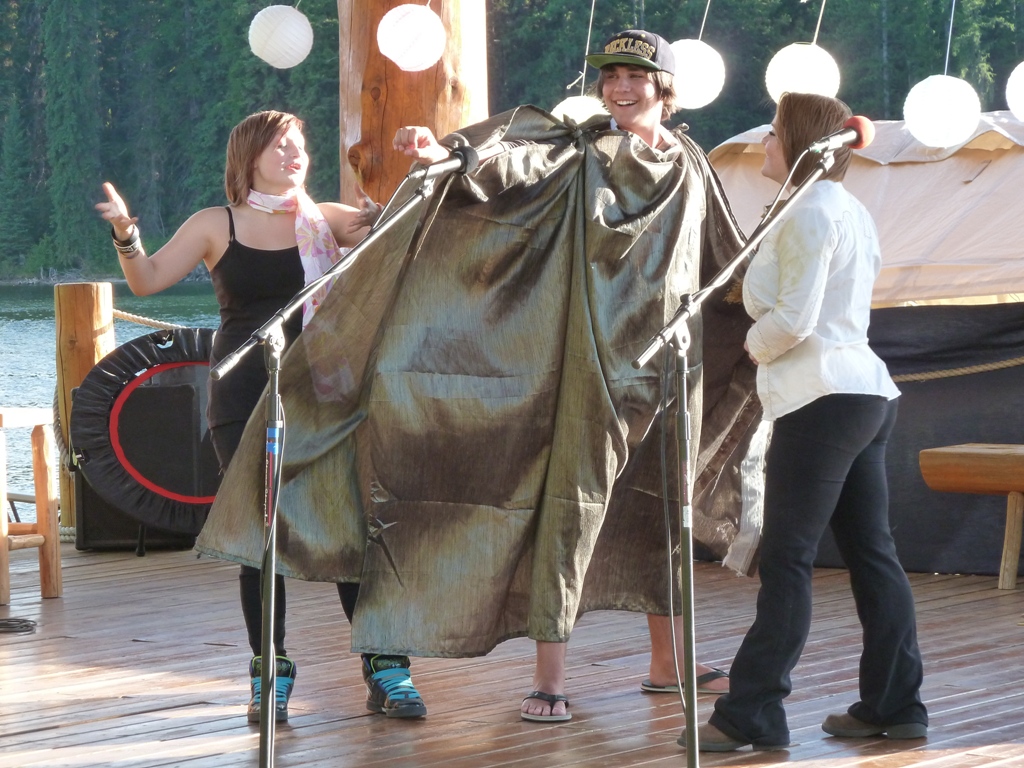When Sam* came to the Empowerment through Performance Workshop, he was the epitome of youthful unhappiness. By the tender age of 14, this young man had suffered a childhood of physical abuse and had subsequently been in and out of “juvie” (juvenile detention) five times. During the workshop he was housed at a local youth shelter, not knowing where he would go next. His life was in a state of flux.
With long, thick hair brushed forward so as to completely cover his eyes, Sam kept it defiantly in place with his baseball cap. To add to his armor, a heavy hood hid his face from view. Jeans slung low, fists shoved deep in his pockets, it was clear from day one that Sam had built walls of defense and no one was getting in.
Choosing to isolate himself from the group and hiding beneath his protective layers, Sam arrived, determined not to participate or let anyone hear his voice.
On Day 2, the group moved outside to sit in the Montana sunshine, surrounded by majestic fir trees with the mountains shimmering in the distance. It was a tranquil setting and perfect to explore voice projection.
The apprehensive participants were asked to stand in front of the group and say their name as loud and clear as possible. From a distance, educator Jen jubilantly called out, “Share your voice!”. Each young person was gently guided to repeat this until it was delivered with power, pride and dignity.
Then, it was Sam’s turn to “share his voice”. Still hooded and hiding (despite the heat of the mid morning sun), Sam balked. He refused, and when asked again, he completely shut down. Sinking low in his chair, he fell deep into a quiet angry mood, red-faced with shame at his perceived humiliation.
A ‘time-out’ was called and the rest of the group shifted focus away from Sam.
Taken aside, he was given a chance to breathe and the space to reflect. When asked to think about and share why he thought he was having trouble, Sam struggled to articulate the reason he couldn’t let himself relax or join in. Slowly, he revealed that for him “sharing your voice” was only done in anger. In his mind, yelling or the raising of a voice always resulted in fear and abuse. He had sadly learned this through experience, and wouldn’t share his voice because “bad things happened” when he did.
Trusting someone enough to share his beliefs was a major breakthrough. It was reinforced that he was now in a safe place where a voice raised meant joy not anger. It meant celebration, not abuse.
The process took some time but with consistent, gentle coaching, great strides were made in Sam’s progress. He began to share his voice in a healthy way without attaching fear or anger to it.
By Day 3, Sam dropped his hood, pushed the hair back out of his eyes, and smiled a little. Sharing thoughts and ideas, he even created a costumed character to introduce to the group. They all applauded his inventiveness, wit and humor.
On the final night, Sam was a major part of the young theatre troupe’s ‘Night At The Ranch’ performance. He contributed greatly as the sound designer and performed beautifully in two roles; the lover going off to war in ‘What I Did For Love’ and the Wizard in the ‘Wizard of Funk’ sketch.
When the Certificate’s of Achievement were handed out that night to the applause and cheers of the audience, it was heartwarming to see a fresh-faced teenage boy, hair out of his eyes, beaming and…
Sharing his voice.
(* – Sam is not his real name nor is he in the image above, to preserve anonymity)

